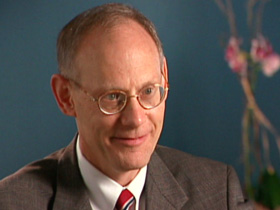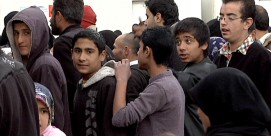In This Episode << SLIDE LEFT TO SEE ADDITIONAL SEGMENTS
Professor Allen Hertzke Extended Interview
Read more of Kim Lawton’s October 14, 2008 interview with University of Oklahoma professor Allen Hertzke, a visiting fellow at the Pew Forum on Religion and Public Life, on religion and America’s role in the world:
Q: How do people’s religious views affect how they see America and how they see America’s role in the world?
A: In spite of everything that has happened, the majority of Americans still see America as a place blessed by God with a divine mission in the world. This is especially true of more observant religionists and evangelicals, who see America as having a divine mission in the world and who also believe that we have a special Christian mission in the world. And that can take many forms. It does take a humanitarian form, but it also can take a more military form.
Q: How is that related to people’s religious views? Where does this come from?

A: From the beginning of the colonies, many Americans saw themselves as on a divine mission. The Puritans saw themselves as on an errand in the wilderness to create a holy commonwealth. In fact, it was a Puritan who uttered the phrase that America should be “set on a hill, a light to the nations.” Of course, Ronald Reagan put rhetorical wings to that by saying America should be “a shining city on a hill,” an example to the nations, a leader of the nations. And so when America became a preeminent global power, many Americans saw that as a vindication in a way of our special, divine mission on Earth. And if you look at the survey, most Americans believe that we have a moral obligation to lead the world, and especially evangelicals and more religiously observant Americans, they believe that we have an obligation to be an example of a Christian nation, a Christian example to the world, and so that shapes not only how we view our humanitarian role but also our military role.
Q: What does that mean when people think of us as a Christian nation? That has been controversial.
A: It is controversial. In fact, theologically it is controversial. There are rather traditional religionists who eschew that term, because a nation cannot be Christian in some fundamental, theological sense. But I think the idea is that the majority of the population are Christians whose values infuse the nation’s politics and, in fact, do shape how the nation positions itself in the world. If you look at issues like humanitarian relief, AIDS funding, support for poverty relief development, debt relief around the world, many religious Americans see that as an extension of their own charitable impulses from their religious upbringing, and so I think there is a strong support for America’s humanitarian role because of the religious self-consciousness of America.
Q: Americans use the language “this is a moral duty. We have to help people.”
A: Americans, I think, are uncomfortable with just naked self-interest. Even though we know self-interest operates in foreign policy, Americans are more comfortable with a moral vocabulary with respect to our foreign policy. So the war in Iraq is seen through that prism, that we have a special role to play in stabilizing that country and bringing them democracy and so forth, even though there may be other calculated, self-interested reasons for what we are doing there. I think that’s because of our religious culture that Americans want to see–even if they fall short themselves and their nation falls short, they want to believe that our motivations spring from our religious values.
Q: Our survey found some ambivalence among American people about whether we are, indeed, a force for good and whether American intervention does more harm than good.
A: I think one of the most interesting findings in your survey was the question about “more harm than good.” A majority of people, including evangelicals, said yes, sometimes America does more harm than good. I think how that can be reconciled with the view that America has a divine mission and generally is a force for good is a recognition that sometimes we get it wrong; that even while we have good intentions, we make mistakes. I thought that was a pretty interesting finding, a recognition that we are not always right. We might have the right motives, but we’re not always right. We mess up. We muck up.
Q: Both presidential candidates, Barack Obama and John McCain, talked in the debates about America being a force for good in the world. What is the significance of that?
A: I think it’s related with the notion that America is a force for good, is directly related to this understanding that America has a divine mission in the world and that we are a nation of believers who want their nation to be a force for good. I think there is also a sense of history, that our nation was the one that fought the fascists, that stopped the communist spread, that delivers humanitarian relief when disasters happen. Americans are very supportive of that humanitarian role. And so Americans, at their best, contribute to church-based relief and development organizations. They do believe in fighting poverty and disease, providing maternal care, fighting AIDS, and so forth. So there is that sense of government as just an extension of that kind of relief and development, charitable humanitarian work.
Q: We also found in our survey that a lot of people, again across religious lines, consider poverty, disease, and torture pro-life issues. Has there been a worldview shift on that?
A: I think there has been a sea change in the way conservative religionists view America’s role in the world. I think, especially with young evangelicals, you’re seeing this; that they do, in fact, see poverty, AIDS, health care, disease, even issues like trafficking and religious freedom and human rights as a constellation of issues that embody the sanctity of life and that if, in fact, all human beings on Earth are endowed with inherent dignity, being made in the image and likeness of God, then we ought to take care of the least of these, our brothers. And if the American government has power and resources, the view is that we ought to be doing it. We ought to be providing that support.
Q: You mentioned to me the notion of isolationism versus intervention. Based on our survey information and just watching people and events, where do you see religious Americans on this front?
A: Isolationism has largely vanished in the American landscape. This is particularly interesting with respect to evangelicals, young evangelicals. Evangelicals are very interventionist in their view about America’s role in the world. They want the United States to take an activist role on the world stage. They are not isolationist, as many were in the 1950s and ’60s. That’s where I think there has been a real sea change. Whether it is completing the war in Iraq and having victory there, or whether it is fighting global trafficking, or whether it’s fighting poverty, or whether it’s fighting AIDS, or whether it’s providing humanitarian relief, Americans want an activist role for the United States, in spite of all the things that have happened over the past few years.
Q: There was a time when evangelicals mistrusted the UN. There seems to have been a real change on that, too.
A: There still is some suspicion of the UN, and there is a view that the UN is somewhat dysfunctional, within the evangelical community, but there is support still for the idea of a United Nations, the idea of international law, and the idea of working in some cases through the United Nations. There are some ideological differences about how the United States should operate in the world. I think with conservative evangelicals and conservative Catholics, they are much more comfortable with unilateral American action, whereas more liberal Catholics and liberal mainline Protestants and Jews are more comfortable with action through the United Nations and other multilateral forums.
Q: How did foreign policy of the last eight years affect American views on US engagement in the world?
A: That’s a good question. I think the last eight years have been tempering for a lot of Americans. Especially the problems with the Iraq war have been very sobering to Americans, and that’s why a lot of Americans, including the majority of evangelicals, say that America sometimes cannot be a force for good in the world, can mess up. So I think that while Americans still support a major American role in the world, they want us to be smart about it. They are very concerned about not making the same mistakes we made in Iraq, not going in without knowing what we were going to do.
Q: How did 9/11 complicate American foreign policy?
A: It dominates American foreign policy. I think it thrust the nation into a relationship with the Islamic world that is inevitable, vital, and complicated. The relationship between the United States and the Islamic world is the central relationship on the global stage today, and it will determine the fate of world peace and conflict for generations, I think. What you see in the evangelical community, or among other conservative religionists, is a fear of the Muslim world, a concern about terrorism, so that overlaid with this concern about poverty and humanitarian issues and human rights is, in fact, a kind of new cold war beginning to emerge, especially for more conservative religionists, who really see a kind of confrontation with radical Islam as being like the cold war.
Q: Is there a debate about balancing priorities? Should we be more a force for good in terms of helping people with illness, disease, poverty, or should we be focusing on fighting terrorism?
A: If you look at the relative weights, right now fighting terrorism dominates people’s thinking about foreign policy. When you ask them specific questions, they say they are in favor of fighting for human rights, fighting for religious freedom, providing humanitarian relief, fighting against AIDS. So Americans support that. But if you ask them what issues are important to them, really important, fighting terrorism is right up there.
Q: You mentioned this concern that America sometimes gets it wrong, sometimes does more harm than good. Is there debate about whether specifically the war in Iraq has in some way compromised America’s moral authority in the world to work on issues like human rights?
A: I think that recognition is especially true at elite levels–leaders of churches, priests, bishops, and so forth, that in fact the mistakes we made in Iraq, particularly abuse of prisoners, really did undercut our moral standing. The United States is less able to act against genocide in Darfur because of the erosion of our moral standing because of Iraq. And there is no way that the United States is going to be able to intervene in another Muslim nation with troops on the ground. So whatever we might do to fight genocide in Darfur has been undermined by the Iraq war.
Q: Of course, the economy now is certainly taking center stage. How do you see concerns about the economy affecting how people view America’s role in the world? Is that bringing new complications, new tensions?
A: The economy is going to dominate the calculations of people with respect to public policy in the next few years. Even though Americans are concerned about the war on terror, they are more concerned right now about the economy. There hasn’t been a major attack on the United States since 9/11. The war in Iraq seems to be going better. There will be focus on Afghanistan. But those will be at the elite level. What Americans want to know is, are you going to rescue the economy? And so I think we are going to see–that’s going to probably hurt the Republican Party because it is the party in power in the White House, and so I think there is going to be some erosion of support among evangelicals for Republicans in this election cycle. So the economy is going to dominate. Even though Americans still want the nation to be active on foreign policy, they want our leaders to solve the economic crisis.
Q: Do you foresee some kind of tension when people talk about poverty at home versus abroad? We need to help people who are suffering with poverty and famine and disease overseas, but is there going to be somewhat of a more isolationist view on those issues?
A: The budget will be a crucial factor. Americans, and American leaders, will be less likely to support foreign aid, American dollars going abroad, because of our economic crisis and our debt. So I think there will be–it will be a challenge for the next president to make a case for American dollars going abroad when we have such an economic crisis at home. In that sense, it’s going to clip our wings a little bit with respect to the kind of role we play in the world. Right now, America will be called upon to play a role in stabilizing the banking system, as opposed to other kinds of foreign engagement.
Q: So fundamentally Americans want to do things about poverty, they want to worry about humanitarian things–genocide, human rights. Fundamentally that’s a priority, but budgets at home, you think, might be a more important issue?
A: Budgets are a greater factor and the domestic economy is going to be a dominant factor for a good period of time. I mean, the United States cannot retreat from the world, and our evidence from the survey suggests that Americans don’t want us to retreat from the world, but we are not going to be able to play the kind of leadership role in the world unless we get our economy back in shape.
Q: Is there anything else that struck you about the survey that you wanted to add?
A: The survey, I think, showed that evangelicals support an active American role in the world. They are concerned about humanitarian issues and human rights. But they also support a more muscular foreign policy. They do see the United States playing a role in national security, a role in fighting terrorism, a role in winning the war in Iraq. So on the one hand, they support a humanitarian policy, but on the other hand, a more muscular foreign policy. Another thing I noticed that comes out in the survey is the extent to which a segment of the American population, particularly young evangelicals, are actually engaged in the world by traveling around the world on mission trips. Now it may seem small, but fifteen percent of all evangelical youth have actually traveled abroad on mission trips. If you think about it, that’s a really tremendously large number of Americans, young Americans, who are traveling abroad on mission trips–to Africa, to Asia, to Latin America, to poverty-stricken places, places where there has been war and famine, and this sensitizes them to the plight especially of their fellow believers around the world, but also of just suffering humanity. Then they talk with their friends and they give talks in churches. So I think that has had an impact on internationalizing the vision of the conservative Christian community.
Q: We’ve got a worldwide Catholic Church that is very international in its leadership. We have mainline congregations active overseas. We’ve got long-term missionary efforts on the part of many religious groups. We’ve got Jews with co-religionists in other places in the world. Do people of faith have more awareness of global issues because of these relationships?
A: I don’t think there is any question that the globalization of faith and the vitality of faith in the United States have combined to produce sensitivity about global issues among Americans. Every major American religious community has ties abroad of some sort or other. For the Christian world, in fact, American churches are increasingly becoming branches of worldwide churches. For the Catholic Church, this has also been true. But whether it’s the Mormon Church, where now the majority of Mormons live abroad, or mainline Protestants–the majority of Anglicans live in Africa, as opposed to England and the United States, whether it’s evangelicals, every major religious community in America has connections around the world. And with global communication, with travel, it means they are increasingly connected to those communities and, in many cases, view their brothers and sisters as heroic believers, as ones who suffer for their faith. In the Christian community, you have a lot of foreign Christians who come here and speak about their communities, about persecution, about poverty, violence, and that sensitizes their brothers and sisters here. So I think there is no question�There is something about the fact that we are a nation of immigrants and our religious communities have linkages abroad that produce this kind of sympathy toward an activist American foreign policy.
I think one other thing that came out in the survey is that there has been a generational change within the evangelical community. Young evangelicals are, in fact, very concerned about a broader array of issues–global warming, poverty, AIDS–but they still are very conservative and traditional on social issues. They are opposed to gay marriage. They want abortion restricted under most or all circumstances. And so the issue, I think, for young evangelicals in their vote is, what will be salient to them? If, in fact, the social issues are more salient than other issues, they’ll vote that way. So I think, ultimately, most young evangelicals will vote for John McCain, even though they do have a wider array of concerns that might be reflected in Barack Obama’s positions on issues. I think that’s interesting.
Q: You were saying America has a divine mission, but America’s role as an economic and military leader is changing. How does that affect this divine mission?
A: That’s a great question. I think that, while most Americans, especially most religious Americans, see the nation as having a divine mission on the world stage, there will be, I think, some interest in a more calibrated, smart, and perhaps more moderate role on the world stage. They still want us to be a leader, but they want us to be smart about it–not march into a nation with our army unless we know what we’re doing. And so I think that people have been tempered, sobered by the crises around the world and want the nation to–they want the nation to play a positive role, but they want us to be smart about it.







